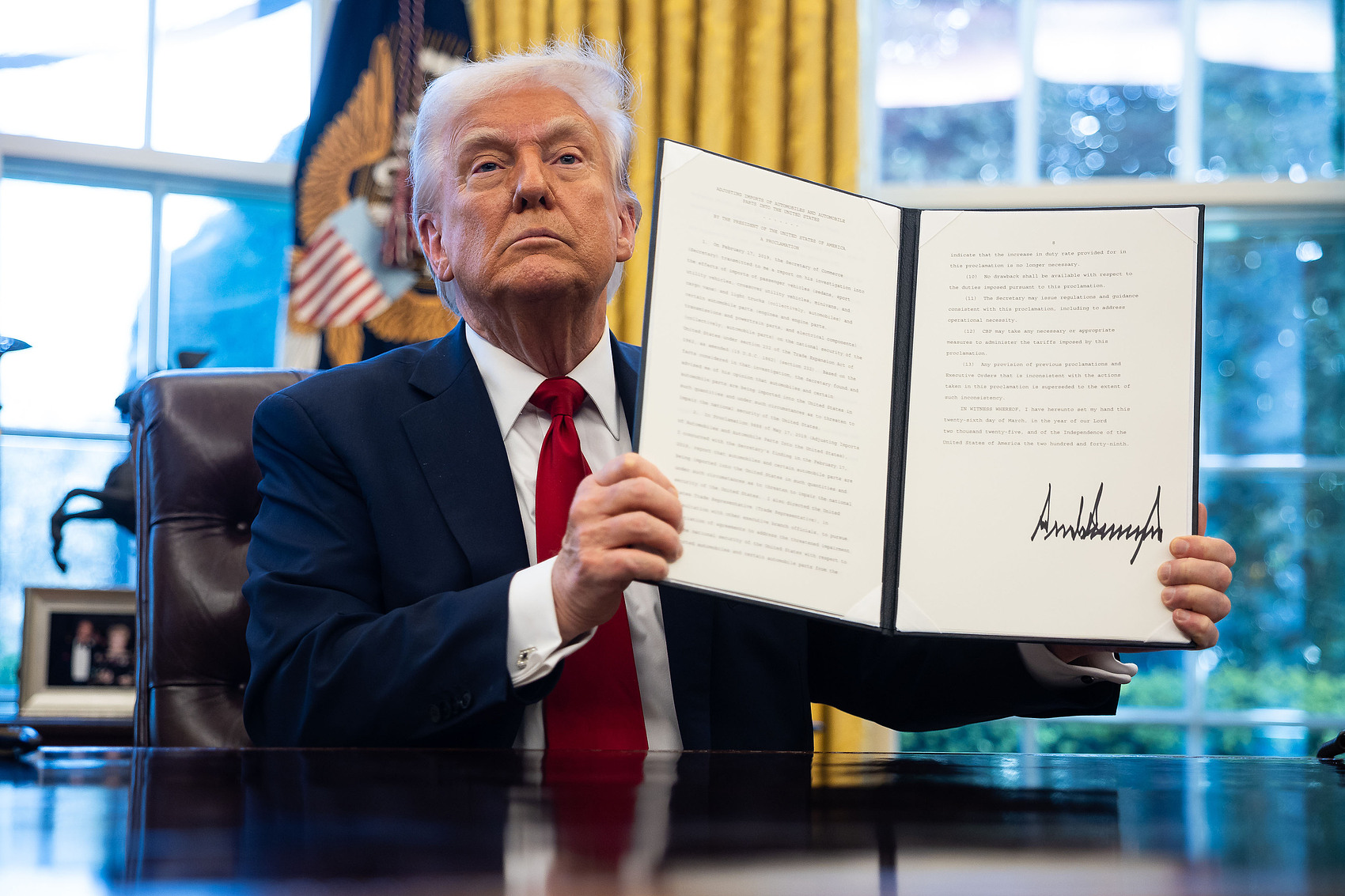
U.S. President Donald Trump holds up an Executive Order imposing a 25 percent tariff on imports of automobiles and certain automobile parts in the Oval Office of the White House on March 26, 2025, local time. (Photo: CFP)
U.S. President Donald Trump announced plans to impose a 25 percent tariff on auto imports on March 26, local time, with the measure set to take effect on April 2. Trump has called this date a "liberation day," promising additional rounds of tariffs that could have broader implications than the levies he has already implemented on goods from various countries.
Since taking office in January, Trump has made multiple tariff-related statements targeting a range of countries, including Canada, China, Colombia, European nations, India, Mexico, and Venezuela. These measures have affected industries such as steel, aluminum, wine, oil and gas, and automobiles.
Trump insists that his tariff policies will help revive domestic manufacturing and create jobs, though economists warn that the reality may be far more complex and costly.
Trump's tariffs: Harming, not helping, American businesses
Experts argue that Trump's tariff strategy could ultimately harm American companies and consumers rather than the trading partners it seeks to penalize.
"This is very bad for American businesses because many rely on imports for essential products. Those imports will become more expensive, making U.S. industries less competitive. It's a deeply self-destructive policy," said Harold James, professor of history and international affairs at Princeton University and an IMF official historian.
Einar Tangen, senior fellow at the Taihe Institute, pointed out the potential inflationary effects. "Take aluminum and steel, for example. The U.S. is the largest importer of these materials. Domestic production cannot meet demand, with capacity utilization already exceeding 90 percent. Higher tariffs on these materials will result in higher costs for consumers on everything from soda cans to cars."
Statistics show that the consequences of Trump's tariff policies could be significant. A 2024 study by the U.S. International Trade Commission estimated that a 25 percent tariff on imports would reduce import volumes by nearly 75 percent, raising average consumer prices by around 5 percent.
Meanwhile, the Tax Foundation calculated that the 2018-2019 trade war tariffs imposed by the first Trump administration and retained by Biden reduced long-term U.S. GDP by 0.2 percent and led to a loss of approximately 142,000 full-time equivalent jobs.
Global retaliation and political backlash
While Trump's tariffs may lower U.S. imports, retaliatory measures from trading partners are already underway, potentially harming American exports and broader economic stability.
The European Union has pledged new duties on U.S. industrial and agricultural products, covering approximately 26 billion euros ($28 billion) worth of goods.
Analysts suggest that Trump's trade policies could also undermine his political standing. "When voters, including many Republicans, face higher costs, they will channel their frustration into political pressure on their representatives in Congress. This could create friction between Trump and lawmakers," said James.
"Trump's tariffs are unsustainable in the long run," added Tangen.
Trump's tariffs threaten global recovery
Beyond U.S. borders, Trump's trade wars are exacerbating global economic fragmentation, potentially derailing recovery efforts. According to the Organization for Economic Cooperation and Development (OECD), these policies are disrupting progress in addressing inflation and economic growth.
In a scenario where the U.S. imposes a blanket 10 percent tariff on all imports—a threat Trump made during his campaign—and trading partners respond in kind, global output could fall by 0.3 percent within three years. The U.S. economy would take a more severe hit, with output declining by 0.7 percent and inflation rising by an average of 0.7 percentage points annually.
Amid rising trade tensions, businesses are looking for stability in an increasingly uncertain global economy. This was evident at the China Development Forum, held in Beijing from March 23 to 24, where more than 80 multinational corporations participated. Notably, nearly 30 were from the United States.
Similarly, from March 25 to 28, the Boao Forum for Asia in China's Hainan has drawn global political and business leaders seeking cooperative solutions amid shifting economic dynamics.
Jeffrey Sachs, a renowned U.S. economist, noted that in the face of numerous global challenges, there is an urgent need for international principles and legal systems that are not solely based on power dynamics.
Ian Goldin, professor of globalization and development at the University of Oxford, echoed this sentiment at the Boao Forum, stressing that global economic development should not be a zero-sum game and that fair competition, rather than coercive tactics, is key to sustainable growth.
Reporter | Liu Xiaodi, Yuan Zixiang, Guo Zedong
Editor | James, Shen He

















